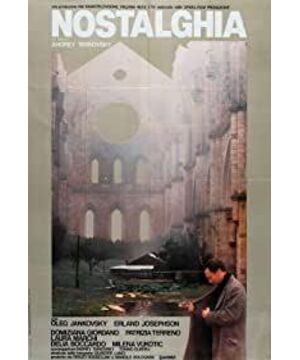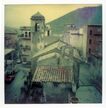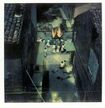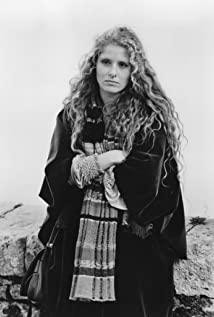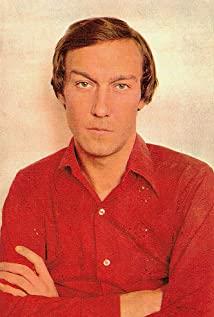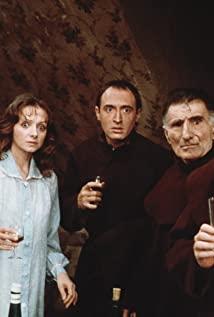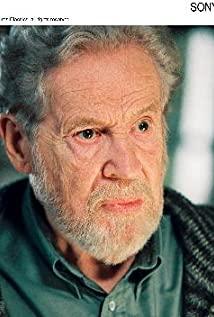However, if the theme of "Nostalgia" is only regarded as nostalgia, it will inevitably underestimate Tarkovsky's ambition and ambition. The bondage of the body, the confinement of identity, and the longing of the homeland will one day be freed, just as each individual knows where his hometown is. Even if it is uneasy and uneasy, there is at least the possibility of breaking free and returning. But what about the numbness of the soul? Spiritual desolation? How many people are unaware of this huge void, let alone take the initiative to embark on a return journey to find a land of nowhere. What Tarkovsky worries about is that we expand the wealth of the material realm, while depriving people of the spiritual dimension, ignoring its threats. Yet a man can restore his covenant with the source of his soul, thereby restoring his relationship to the meaning of life, and the way to regain moral integrity is to give himself in sacrifice. It is through the film's two interconnected and interacting characters, Andrei Gorchakov and Dominic, that Tarkovsky breaks down the traditional barriers between reason and madness to find us a A land of nowhere for souls able to strike a balance between "reality and desired harmony".
The movie "Nostalgia" tells a story: Gorchakov, a poet from Russia, came to Italy alone to collect the biographical information of the Russian serf composer Bezovsky in order to write an opera script. Russian poets in a foreign land are in a way one of what Tarkovsky calls "the worst immigrants": their national roots, their past, their culture, their native land. , the fateful attachment of their relatives and friends; ... (has) a sadness that is difficult to assimilate, and a bluntness to accept a foreign way of life. At the beginning of the film, the poet shows the rejection of hometown nostalgia and foreign reality, the opposition between nationalism and cosmopolitanism, and his personal self-isolation and refusal to intervene in the outside world—he speaks to the female translator very much like Moscones The autumn beauty of Kush Park was of no interest, because he knew that nothing could compare to the like, and nothing could be more than a false imitation. He traveled halfway across Italy and finally refused to walk into the church with the female translator to see the Madonna statue he had been talking about for a long time. He told the female translator to throw away the translation of the Russian poet's poetry she was reading, because poetry could not be translated. Everything in Russia seemed good to him, and he couldn't help but feel proud, and the exclusivity of the foreign language gave everything familiar a halo of divine perfection in memory. The poet tries to stop, and sets up a fence in his mind by default. The self-appreciation of the things in his hometown makes him unconsciously reject others, foreign countries, and strangeness. However, in the active exclusion, the poet is also forced to distance himself from others and the outside world. This unapproachable and incomprehensible loneliness makes the poet anxious. In fact, the poet is conscious of the spiritual predicament he faces. He realizes that "human beings are not alone and abandoned in the empty world, but are closely connected with the past and the future through countless clues; Each person lives his own life, and at the same time creates the shackles between him and the world, and the whole of human history." To completely balance this unease of being isolated and smooth this fear of wandering and exile, we must He has established a certain spiritual connection with the entire human history, and the solution he can think of may not even be believed by him, just as he said to the female translator: abolish the border, abolish the country.
With this intense unease, the poet met the legendary madman who locked his family for seven years - Dominic. When Gorchakov first met Dominica, he felt a faint resonance in his soul, how familiar the incomprehensible panic and unreachable unease were. The poet watched him muttering to himself what others could not understand, doing crazy things that others could not understand, being isolated from the rational world and actively isolating the rational world, alienating others while alienating others. This homogeneity of soul makes the poet's perception of Dominic unique - he's not crazy, he just has faith. No one understands lunatics, thinks they are troublesome, burdensome, we refuse to understand them, understand their loneliness, but they are closer to the truth.
Out of the resonance of loneliness, isolation and anxiety, the poet asked a female translator to accompany him to Dominica's residence. However, the female translator's several negotiations were indifferently rejected by Dominica, because the female translator's view of Dominica was still secular. She neither agreed with Dominica's actions, nor was interested in the reasons behind her actions. She didn't intend to enter Dominic's realm, nor did she want to drag him into her own world. And Gorchakov easily broke through the strong ice fortress of Dominica, he said: I think I understand why you do that. Understanding is the first step to breaking the isolation between people. Gorchakov did not think that Dominic’s actions were completely the performance of a lunatic, a state of madness that could not be understood, accepted and recognized by reason. As Foucault discussed in Madness and Civilization, the madman is not without reason, the hallucination is a displacement of the imagination in the disease, and once the madman falls into the predicament of madness, they are governed by the logic of reason . When they entered the illusion world created by themselves, they were extremely strong theoretical logic reasoners who fell into their own imaginary world. In Gorchakov's view, although Dominic's actions are bizarre and even morbidly cruel in the eyes of the world, they are understandable in the world he constructed and in the logic of his discourse. Because of this preliminary understanding, Gorchakov did not regard Dominic's madness as a rational other, isolating, rejecting, ironic, insulting, punishing, depriving him of his dignity and personality as a human being, just like everyone else. do that. The change that this attitude has brought to Dominica is undoubtedly huge.
What kind of person was Dominic? He lives in his own world, following his own behavioral logic, pedaling a bicycle that won't move tastelessly, filling the leaky room with tiny wine bottles, with wrong formulas written on the walls, and in the absence of walls Stubbornly passing through the empty door in the sheltered room, he confines his family and himself in the dark and damp empty room to await the end. His "belief" seemed strange and incomprehensible under the gaze of the rational world. The instinct to reject aliens allowed reason to constantly suppress the existence of madness in his field, and regarded madness as an unavoidable infectious disease. All people from civilized society obtain the proof of self-rationality by isolating his existence and disregarding his dignity, and establish the legitimacy of civilization by declaring the illegality of madness. In the face of hostility and blows from others, Dominic takes the attitude of "just treat them as if they don't exist, just go your own way", "no matter what happens, don't intervene", he constantly suggests to himself "you must be different" , thereby circumventing contact with the world and the mundane and efforts to reach an understanding. Whether it is active isolation or passive isolation, what we can see is that Dominic, who has long been addicted to the doomsday imagination, is numb and indifferent to the hostile external rational world, whenever he tries to have a dialogue with the rational world. always with the sarcastic encouragement - "Well said, Donimick!" No one was really listening to what he had to say, no one was trying to understand the fear and redemption he was trying to convey, and they kept going. To reinforce his madness and marginality with false tolerance and false praise, to imprison him in damp and dark corners, to crucify him on the cross of madmen, as Dostoevsky said— - They are "confirming their sanity by closing their neighbors". Constantly marginalized, ignored, and treated with indifference, people look at Dominic not so much as a person, but at the crazy label on his head, and they don't care about his fears, thoughts, and beliefs , and selectively only look at his mysterious madness and its incompatibility with the rational world. Over time, Dominic finally gave up the effort and possibility of dialogue with the rational world.
The emergence of Gorchakov, however, had an impact on this relatively static equilibrium. The poet who dreams of breaking down the indifferent boundaries of isolation between people represents a possibility of dialogue from the rational world, but also a force that tries to reach mutual understanding. He responds to Dominic's idea of a deeply afflicted beginning, he understands the meaning of Dominic's bizarre formulas smeared on the walls, and he approves of his apocalypse that a drop of oil plus a drop of oil equals a large drop of oil From a formal point of view, he can understand the ultimate concern of Dominica's soul for mankind - to save mankind from the ruthless, crazy and deranged modern civilization, it cannot be done individually or individually, but must be done together. His appearance rekindled Dominica's hope of saving the world-although people in this world have fallen, there is still the possibility of awakening and saving. He admitted his selfishness, and in the fear of the end, he only wanted to save his family, and the real salvation was all. In the process of passing on the light of redemption to Gorchakov, that is, how to use candles to complete a secret religious ritual to save the world, Dominic completed a true self-confession and salvation.
If Gorchakov's influence on Dominica is reflected as a sudden impetus, Dominica's influence on Gorchakov is more similar to a subversive catalytic effect. It was his madness that externalized the unease and fear that lurked in Gorchakov's heart into a real curiosity, a kind of attraction for fellow sufferers. Gorchakov, who was constrained by the rational world and did not dare to show it, laughed helplessly, but on the other hand he couldn't help feeling the same way. The specific behavior was that when Dominica handed over the candle that carried expectations and responsibilities to him, he accepted it. When he came over, he shook his head contemptuously, put it aside, and after a moment of hesitation, he took it again. This simple move meant a lot because it wasn't an unintentional move, but the result of Gorchakov's thoughtful thinking. At this time, he had turned from being simply attracted to a certain degree of understanding and recognition. When he accepted this candle, he also accepted Dominic into his world.
The next scene is even more meaningful. Gorchakov used the power of alcohol to enter a state of intoxication and excitement, that is to say, using alcohol as a medium, he stepped into the field of madness. In this field, he is completely free and unrestrained. He recites poetry ecstatically, chats with children who appear out of nowhere, laughs wildly, burns poetry collections, thinks alone, searches for the end of life, the destination of spirit, the value of the soul. In this crazy world, I temporarily escaped the constraints of rational civilization and the repression of power discourse, stripped away all the shelter and cover outside the individual, and truly touched the inner hesitation, the fear of death, and the anxiety of losing faith. The sadness of the wandering soul, he began to recognize Dominic's heart for salvation, the story he told the little girl about salvation, although the ending was that the rescued angrily expressed his unwillingness to be rescued, but the story itself did not exactly symbolize his attempt to save the world. To save some of the hearts of entering the world? Although the ironic ending showed that he was still hesitating, in this sense Gorchakov had entered the spiritual world of Dominica, so in his dream, he stood in front of the mirror in the wardrobe, It was Dominic's face that was reflected in the mirror. At that moment, Dominica and Gorchakov, and the world and the group they represent, somehow reconciled and became one.
In fact, the bizarre image exchange in the mirror this time is not as abrupt and inexplicable as the viewers see at this time. This mysterious spiritual dialogue between him and Gorchakov was already hinted at long before Dominic appeared, and the director specially arranged for the shepherd dog that appeared countless times in Gorchakov's reminiscence of his hometown. From the dream, he walked into Gorchakov's bed in the hotel, and then followed Dominic strangely around the hot spring pool the next day, and then always followed Dominic's side, acting as his listener and protector, just as Gorchakov did what he wanted. In another detail, Dominic’s room contains another space. In this space, Gorchakov saw a distant river originating from Mianshan in the distance. It was the river of his hometown in his memory, his hometown. The mountains and the white fog of his hometown, the strong feeling of wandering, anxiety, restlessness, and overwhelm grabbed his attention instantly, or in Dominica's space, this emotion is common. From this, we can draw a conclusion that is not too radical. The director consciously linked the fates of Dominic and Gorchakov, quietly strengthening the connection between them, until their mutual influence blended together and became irresistible. The stripped flesh, and finally to the same end.
Gorchakov's understanding and transmission made Dominique full of hope again, and he decided to make the biggest effort to dialogue with the numb rational society and the degenerate modern civilization in his life. He is like a sober prophet, "as if a person from the future is forced to live in the past", he sees the end of human society, the endless separation and the degeneration of the soul, rationality takes away human emotions, modern civilization makes Humans no longer cherish the gifts of nature, the flesh tightly binds the soul, and the value determinism kidnaps people's conscience and belief. Prophets were exiled to sea as madmen (14th-16th centuries: Ship of Fools), locked up in asylums (17th century: Great Confinement), quarantined as a plague (18th century), sent to insane asylums as patients Healing, madness has been expelled from the world of reason as the presence of human animality, death, from beginning to end. Expulsion means borders, borders isolate others and imprison oneself at the same time. The so-called "health" is nothing more than the self-enclosed prison of human reason, and this is exactly the water, fire, ashes and skeletons that bring the world to the brink of destruction! Dominica stood on the high bronze sculpture in the Roman Forum and called for a cry to make a new covenant with the people: there will be light in the night, snow will fall in August, the proud will disappear, the humble will live; the world will be united again, there will be no more disintegration. Open your eyes and look at nature, and you will understand the simplicity of life. We will return to the origin of the past, the origin of life. What a world this is, to have a madman to tell you that you should be ashamed! Dominic's madness or as it says in 1 Corinthians: "For the lost, the word of God is madness; for us who are saved, it is the power of the Lord. . . . …Hasn’t the Lord turned the wisdom of this world into madness? Since the world does not know the Lord in the wisdom of the Lord by his own wisdom, so through the madness he imparts, the Lord will turn the wisdom of those who believe in him into madness. Salvation is regarded as a good deed." However, Dominic's great act of kindness failed to enter the realm of the rational world at all. People gathered in the square and watched silently, as if they were enjoying a long-awaited performance. With a numb expression on his face, he thought to himself: It's so frustrating that the music can't be played, this line is so pretentious and old-fashioned, when will the climax of self-immolation come? Until Dominic ignited the gasoline on his body and turned his life into a burning candle and fell to the ground and struggled in pain, people just retreated in fear, for fear of contracting the madman's virus, just as they have treated madness for thousands of years. As he did - "Abandonment was his salvation, and rejection gave him another sacrament" . So even "Dominic struggles to achieve his own response, to choose his own way of martyrdom without succumbing to the clichéd, acerbic pursuit of personal material privilege, trying to use his own efforts, by his example of self-sacrifice. , to stop the road that makes mankind madly rush to self-destruction", his ending is still downright tragic, because until the last moment, it is only his kind who is willing to mourn for Dominic a few times - the same Bestial Sheepdog. His outcry has not awakened a world addicted to complacency and blindness, where people are ignorant of their own spiritual loss, ignorant of their sacred mission, where the repression of power relations is everywhere, and the disintegration of spiritual confinement is a long way off. , madness is still regarded as the eternal other, forever isolated from the world.
The fate of the madman Dominic is sad, and Tarkovsky has the deepest sympathy and admiration for him. In his opinion, Dominic is more worthy of writing than Gorchakov: "Gorchakov is only reflecting on how much he haunts the imperfections of the world, Dominic takes action resolutely, he His commitment is even more unreserved: Dominique's last actions make it clear that his sense of responsibility has never been of any abstract quality. By contrast, Gorchakov is chagrined at his inability to endure. , it seems common." In his opinion, Dominic is not so much a madman with strange words and deeds, but a weak person who fights against the mundane alone. "In terms of his external attributes, he is not a fighter at all... Weakness is the true value and hope of life." The director bluntly expressed his appreciation for Dominic, "I have always liked the kind of person who cannot adapt to the real utilitarian life. . . . There are always people whose strength comes from their spiritual beliefs, who take responsibility for others. These people are often very childlike, but have adult motives: their position is untrue and selfless from a common sense point of view Without me."
Compared with Dominic's fierce decision, Gorchakov's ending seemed calm and distant. He inherited Dominique's last wish, guarding the faint light of salvation and the candle of hope in the pool again and again. If Dominic's speech in the Roman Forum had some kind of overtly provocative element, Gorchakov's behavior was more like a crowd-avoiding, quiet, introverted, self-inquiry and spiritual inquiry. return. It is so difficult to keep the peace of mind and the piety of the faith in the long journey of life and the desolation and depravity of the outside world. It is like protecting a little light before dawn in the breeze, trembling, like walking on thin ice. The candle went out again and again, and Gorchakov came back from the right bank again and again. The deliberate ritualization and the solemn expression on his face gave this almost paranoid move a sense of sanctity. The husband finally succeeded in placing the lit candle on the left bank. His relief must not be simply understood as the success of the ceremony and the fulfillment of Dominique's last wish, but the final connection between Gorchakov's fate, and his fate at the end of his life journey. mind, at peace with the long-standing anxiety within him. The image of water, from shore to shore, the director wants to express not only the theme of salvation, but also a profound meaning of ferrying. "Insanity is a sign of the dark water quality in man. Water quality is a dark disorder, a fluid chaos, the origin and destination of all things" The fluidity of water represents the rejection of boundaries, just as Gorcha The desire expressed by Kov to the female translator: to abolish the border, abolish the state, break the opposition between useful and useless, the distinction between health and disease, and break the barrier between reason and madness. From shore to shore, Gorchakov finally made it. . In a sense, Dominic was successful because he changed Gorchakov.
The film's final shot is a meaningful, poetic scene that reveals the film's ultimate theme - fusion and regression. The director admits that "putting a Russian house in an Italian church does have a metaphorical element". Gorchakov's life died in a new world where borders were abolished, isolation was abolished, and as Donimic had promised, he left this chaotic world and returned to the origin of life, in this world, those who The worlds that belonged to the two places were naturally combined, and the anxiety that he had always had was finally eased. He lay in the wind and snow and died alone, but his mind was extremely peaceful and filled, and he returned to his spiritual eternal land of nothingness.
View more about Nostalghia reviews


